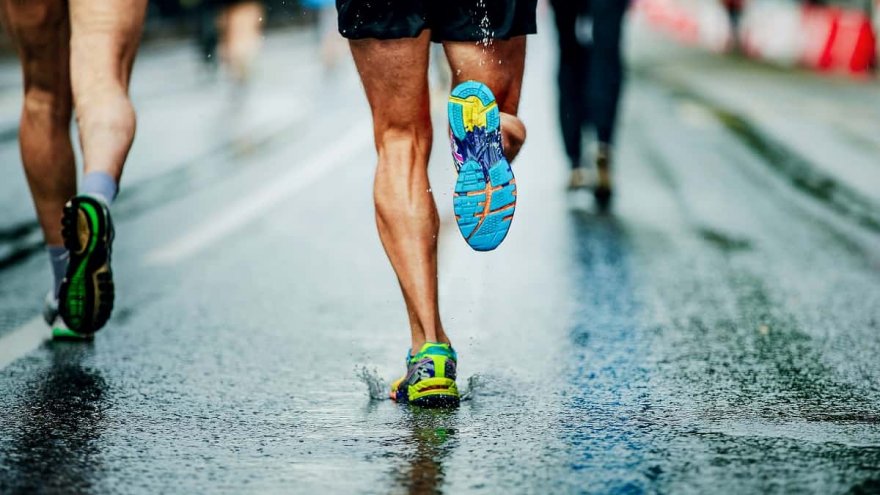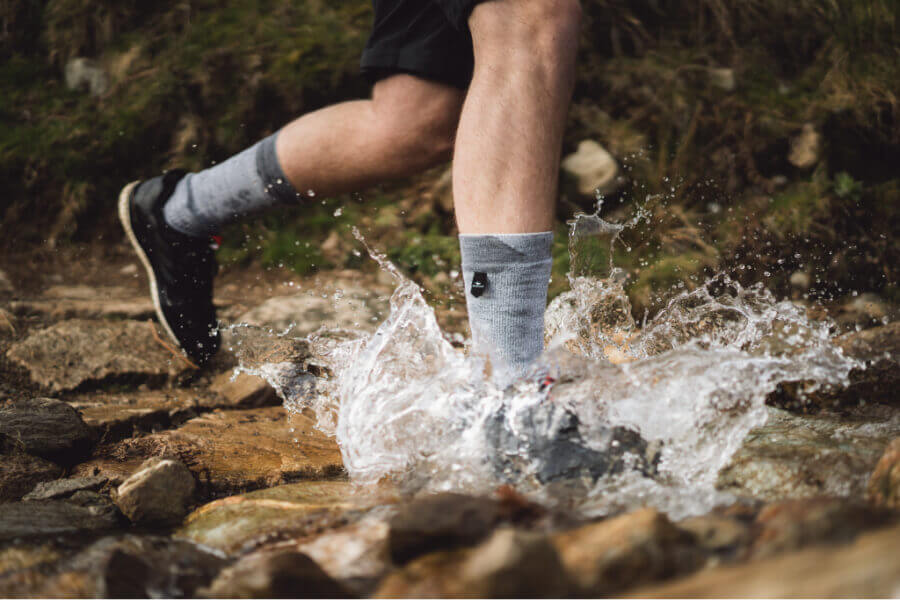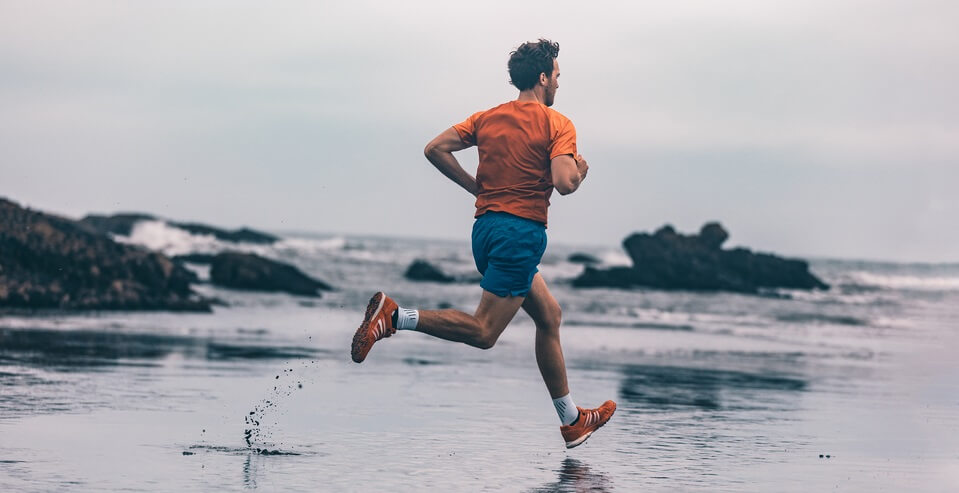The Pros & Cons Of Waterproof Running Shoes

I love running in the rain. I grab myself a baseball-style cap, put on my rain jacket and head out. Sometimes if I think I will be out long enough that music is an absolute necessity, I place my phone in a baggie and tuck it into a pocket to protect it. Usually, I just head out the door and leave most things behind.
However, one day I ended up in a deep puddle; it was 30 degrees and the area was covered with snow. Here is a situation where some waterproof shoes might have helped me out!
What Makes Waterproof Shoes Special?

Waterproof gear is often made from Gore-Tex. What is Gore-Tex? It is basically a membrane that stops liquid from passing through it. Everything from shoes to jackets to other athletic gear has been made from Gore-Tex. In addition to keeping the water out, Gore-Tex is also breathable.
That is a huge perk because sometimes products that keep water out also end up leaving you feeling like you’re trapped inside a balloon. Being waterproof and having breathability is an important and amazing combination!
Another thing that can happen when making a product waterproof is it can get heavier. No one wants heavy running shoes. Good quality, waterproof running shoes will also be relatively light, in addition to repelling water.
Of course, it goes without saying that your waterproof shoes should keep your feet nice and dry whether you are running on the roads or on trails. The last thing you want is wet socks rubbing against the sides of your shoes.
When the runners who write for RunnerClick started rating shoes to come up with the 9 Best Waterproof Running Shoes of 2023, they took all those things into consideration.
Can You Waterproof Running Shoes?
If your running shoes are like most traditional running shoes, the answer is no. Let me be more specific. Running shoes that have mesh panels for ventilation will naturally allow water to flow right through. There is not much you can do about that except learn to dance in the rain.
As someone who has owned many different kinds of shoes and boots, and I have used waterproof sprays and protection creams on them, I understand you may be asking yourself this question: Should you waterproof running shoes?
The answer is that you really can’t because of the material most running shoes are made of. One thing you can do is try waterproof socks. One brand in particular, SealSkinz, has an interesting claim to fame. They are completely waterproof!

Although they are pricy in this case, you absolutely get what you pay for. When you don a pair of SealSkinz, you are paying for quality and comfort.
There are many more waterproof socks out there, so don’t assume you are limited on options! If you google “How to Waterproof Running Shoes”, you are likely to get brought right back to two options: either purchase shoes already waterproofed OR buy waterproof socks.
The Pros/Cons Of Waterproof Shoes

PROS
The biggest benefit to waterproof running shoes is obvious: they keep your feet dry. Whether you are road running or hitting up the trails, dry feet are a real positive. Made from material such as Gore-Tex instead of the mesh of a traditional trainer, these shoes will have your feet dry and happy at the end of each run.
Another perk of waterproof shoes is that you are far less likely to end up with blisters on your feet. Wet feet are far more likely to blister than dry feet. It is just a well-known running fact. Waterproof shoes help to alleviate that concern, keeping your feet healthy! And let’s face it, if your feet are healthy you are more likely to stick to your training plan.
In the cold winter months, keeping your feet dry will also result in keeping them warm. Nothing causes a chill quite as quick as getting yourself wet. This is another real benefit to waterproof shoes.
CONS
So are there any disadvantages? Waterproof shoes are typically heavier than normal running shoes. Especially when on long runs, that can add up.
In addition to being heavier, waterproof shoes are often significantly less flexible than other trainers. For some people, this is a huge negative.
For some people, the price tag is the biggest deterrent to purchasing waterproof shoes. Costing roughly $15-$30 more for a pair, some runners don’t find them necessary.
Are Waterproof Running Shoes Worth It?
If you are a die-hard outdoor runner no matter what the season or weather, then yes. As someone who runs in all sorts of weather ranging from twenty below zero or snowstorms to hot and sunny to torrential downpours, I know the advantages of having good gear.
And waterproof shoes sure do qualify!
So Should You Buy Them?
I guess it really depends on a few factors. Ask yourself these questions:
- Do I often run in the rain?
- When running in the rain, do I end up with blisters on my feet?
- Am I fond of trail running?
- Do I sometimes end up having to step in a puddle or stream when running trails?
- While winter running, do my feet sometimes get wet resulting in me becoming cold and uncomfortable?
- Are many of my training runs longer runs?
- Am I training for an Ultra or other long race?
For anyone logging a lot of miles, training for an Ultra or other long race, and spending a lot of time on trails, I would highly advise investing in some waterproof shoes.
Personally, the running I do in wet weather does not necessitate the investment. However, if my training changes, you bet I would pull the trigger on these!
Latest Articles
 Is Running on a Treadmill Easier Than Running Outside?Runners have their own preferences, whether it is treadmill running, running outside on the road, or exploring trails. So...
Is Running on a Treadmill Easier Than Running Outside?Runners have their own preferences, whether it is treadmill running, running outside on the road, or exploring trails. So... Is It OK to Use Trail Running Shoes on the Road?While trail running shoes can be used on roads, especially in situations where a runner encounters mixed terrains or pref...
Is It OK to Use Trail Running Shoes on the Road?While trail running shoes can be used on roads, especially in situations where a runner encounters mixed terrains or pref... How to Fix Sore Quads After Running?Rest, ice, gentle stretching, and over-the-counter pain relievers can help soothe sore quads after running. Also, ensure ...
How to Fix Sore Quads After Running?Rest, ice, gentle stretching, and over-the-counter pain relievers can help soothe sore quads after running. Also, ensure ... 10 Fruits With The Most Electrolytes to Replace Sports DrinksThese fruits are high in electrolytes such as potassium, magnesium, and calcium, essential for hydration, muscle function...
10 Fruits With The Most Electrolytes to Replace Sports DrinksThese fruits are high in electrolytes such as potassium, magnesium, and calcium, essential for hydration, muscle function...

